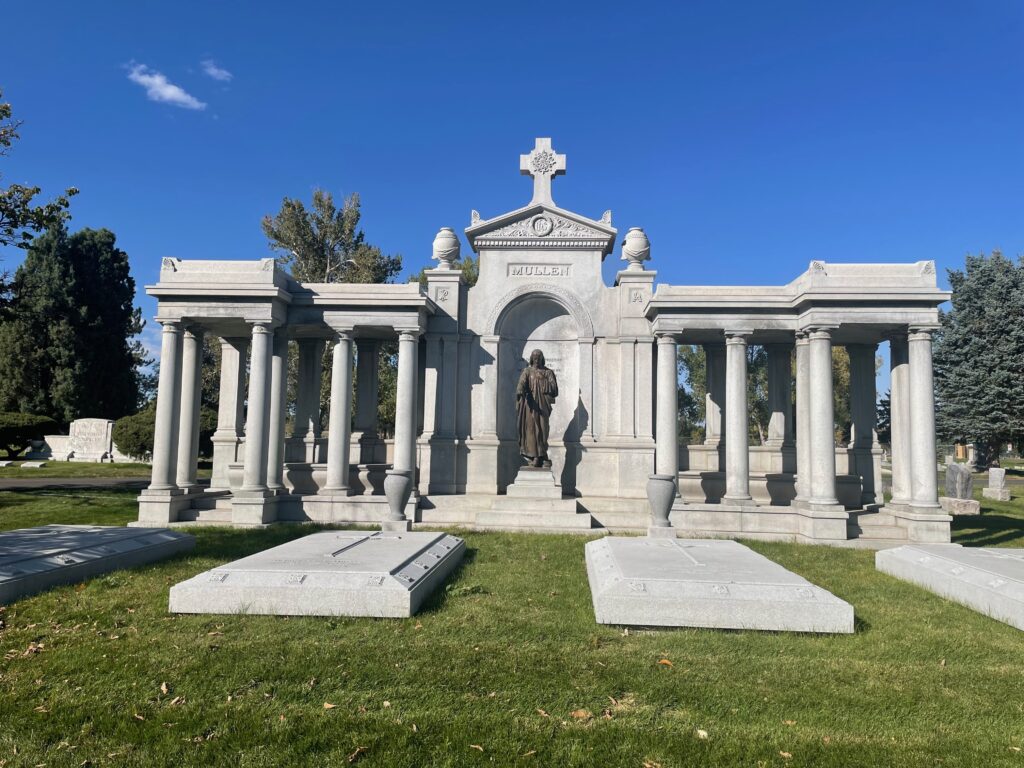Erik Visits an American Grave, Part 1,763
This is the grave of J.K. Mullen.

Born in 1847 in Ballinasloe, County Galway, Ireland, John Kernan Mullen grew up in the United States. His family was not that poorly off, as his father was a reasonably successful barrel maker. but still, the potato famine ruined them and they left in 1856. By the time they moved to the U.S., they were very poor, but still had their skills. As with many Irish immigrants, they left as an extended family and all settled together in Oriskany Falls, New York. At the age of 14, Mullen dropped out of school to work at the mill. But he had an unusual head for business that the owners saw and by 1867, he managed it. He became a good miller and started for the west in the late 1860s, wanting adventure and economic opportunity. He worked in Troy, Kansas for a few years and then in 1871 moved to Denver.
At first, Mullen just continued working for other people’s flour mills in Denver. But he had big ambitions and in 1875 he opened his own mill there. As was common during this period, learning a trade was as much a family business as an individual one and he worked with his family in different parts of the business. After he bought his his initial partner, the business became J.K. Mullen and Company. His wife operated a boarding house for his workers, which was also a way to increase profits. Over the next several years, Mullen bought out many of his competitions and eventually ran what was effectively a flour monopoly in Denver. It was also a family operation and Mullen’s brother had the exclusive contract to supply all of the barrels for the mills. Mullen brought the Hungarian method of milling to Denver, which was the modern rolling mill that produces high-quality white grain flour. That was still fairly new at the time, developed in the 1860s.
Now that he was getting rich through the milling industry, Mullen branched out into other industries. Cattle was a big one for him. He bought up several big time cattle ranches in eastern Colorado and became one of the state’s biggest producers of beef. Then there was banking, where he headed Union Savings and Loan Association and then the First National Bank of Denver. All of this made him the wealthiest man in Denver.
But Mullen’s real interest was being a sort of King of Denver. He was deeply committed to public service, at least as he defined it. One thing that made Mullen different than other super rich guys of the Gilded Age is that he was Irish Catholic. There were some immigrants who became part of the super elite class, such as Andrew Carnegie, but they were extremely and in his Carnegie’s case, painfully Protestant. Mullen was a proud Catholic. So he used his wealth to promote the causes of Catholicism and especially impoverished Irish Catholics in the state. He donated a huge amount of money to Catholic University of America in Washington, D.C. and the library there is named after him. He also created a fund for ten scholarships a year for kids from Colorado to go to Catholic. He created the Little Sisters of the Poor Home for the Aged for elderly indigent Catholics in Denver. He built churches, including for Mexican Catholics, an increasingly large part of the population in Denver as he aged. He also funded an orphanage for Catholic boys in southwest Denver that was not completed at the time of his death.
Mullen was involved in other causes too, including being a big proponent of preparedness in World War I. That itself was interesting because so many Irish were opposed to American entry into the war based on the entirely reasonable position of Fuck England. Not sure how the politics around that worked themselves out in the Denver Irish community. I am sure part of his deal here was proving the Irish were just as good of Americans as anyone else if they just had the right guidance, which of course meant him.
Mullen died in 1929. He was 82 years old.
J.K. Mullen is buried in this extremely subtle and classy grave in Mount Olivet Cemetery, Wheat Ridge, Colorado.
If you would like this series to visit other Gilded Age capitalists, you can donate to cover the required expenses here. Leland Stanford is in Palo Alto, California and Charles Crocker is in Oakland. Previous posts in this series are archived here and here.


